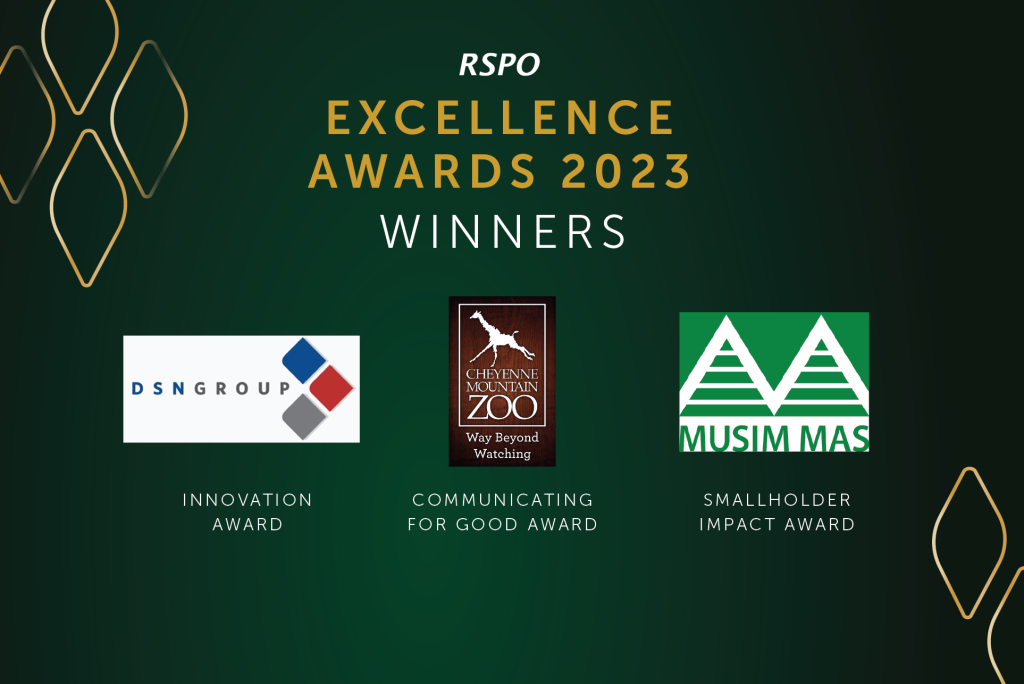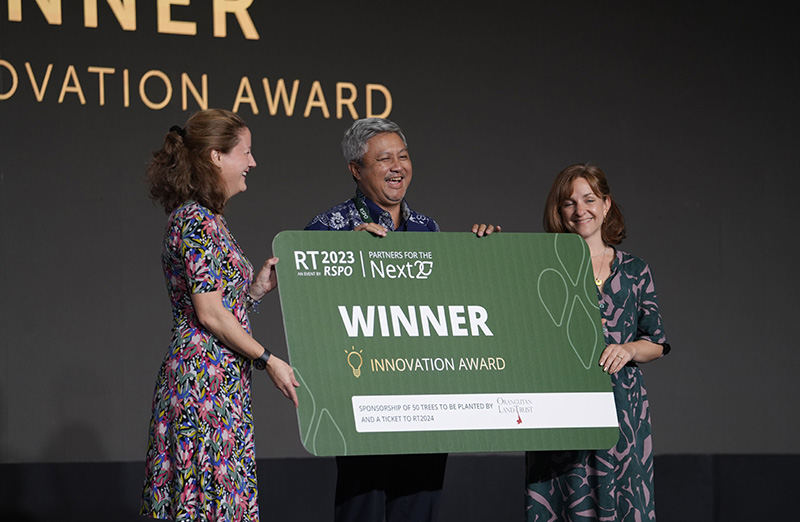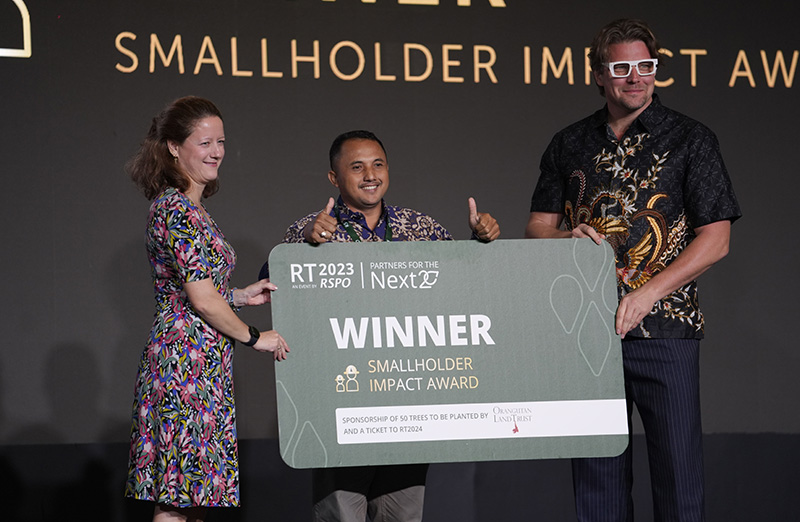
From switching to biodiesel transport to engaging ambassador orangutans, we caught up with three of the winners of the RT2023 Excellence Awards to get their insights on their challenges and key learnings from their winning programmes, embodying the passion and innovation moving the sustainable palm oil industry forward.
Keep on Trucking – Switching to renewable energy to cut fossil fuels and costs
Innovation Award: PT Dharma Satya Nusantara Tbk (DSNG)
Programme: An Effective Alternative Energy Transition for Community Fresh Fruit Bunches (FFB) Trucks
Were there any unexpected challenges or obstacles faced in converting diesel trucks to 100% Bio-CNG, and how were these overcome?
Our FFB and crude palm oil (CPO) trucks are mostly community-owned and operated, as community transport providers are long-term operational partners for us. The main barrier to converting their trucks to run on 100% Bio-CNG is addressing concerns about potential engine impact and resale value after the contract ends.
To overcome this, we provide information on Bio-CNG benefits like reduced GHG emissions and 75% lower maintenance costs from cleaner combustion. We also offer competitive lease rates for the conversion kits to provide cost savings, and commit to re-converting trucks to diesel upon contract exit.
What other alternative energy and sustainability initiatives are the company engaged in, and what are its broader goals for a greener supply chain?
DSNG is committed to investing in renewable energy projects, including methane capture and integrated Bio-CNG production in our palm oil mills. We are diversifying with solar panels in our wood products factory and upscaling biomass fuel production.
Since 2020, these sustainability efforts have saved over 3.7 million litres of fossil fuels, reduced costs and external energy dependency, and lowered our carbon footprint by 10,003 tCO2e. Building on this success, DSNG aims to double the capacity of our methane capture and Bio-CNG plant. Using Bio-CNG to power our trucks strengthens our commitment to circular, sustainable energy across our supply chain.
We envision that by 2028, starting with our palm operations, we will meet almost all energy needs through renewable sources generated in-situ, and we also aim to sell the energy we produce.
How do you stay adaptive and responsive to emerging sustainability trends and regulations?
We position ourselves as learners who are always hungry for all things sustainability. Our Sustainability Advisory Board provides a broad perspective on sustainability trends and emerging issues. We also hold stakeholder engagement forums, inviting stakeholders from civil society organisations, international aid, academia and research institutions to help us find blind spots and provide inputs for improving our sustainability performance.

A Day at the Zoo – Creative myth busting with ambassador orangutans
Communicating for Good Award: Cheyenne Mountain Zoo (CMZ)
Programme: Sustainable Palm Oil Awareness Programme
What do you believe made you stand out to win the Communicating for Good Excellence Award?
Cheyenne Mountain Zoo has been working diligently on our Sustainable Palm Oil Awareness Programme since 2010, and over time, we’ve learned a lot of lessons about what education and outreach strategies work best with our audiences: education, myth busting, hands-on engagement, connecting people with our animal ambassador orangutans, and having direct conversations with supply chain actors about their palm oil journeys.
These lessons have shaped the campaign into a globally recognised programme that engages companies, our peer zoos and aquariums, the guests at our zoo, and reforestation organisations in Southeast Asia, to protect wildlife and wild places. The launch and recent expansion of the World Association of Zoos and Aquarium (WAZA)’s global PalmOil Scan app has also been a major success.
How has your platform been effective in dispelling myths and misconceptions about palm oil?
Our zoo’s awareness programme is oftentimes the first our visitors are hearing of sustainable palm oil instead of the usual calls for boycotting palm oil. This means that our programme’s messaging can be completely contrary to their previously held beliefs. Even though this can seem like a hurdle when trying to educate our audiences, we have a great rapport with our visitors because of our long history of conservation. This pre-established trust as an expert in conservation solutions provides leverage to work towards changing incorrect, preconceived notions about palm oil.
Through signages, infographics, keeper talks, and more, we teach that palm oil can be the most environmentally-friendly option when grown according to RSPO Principles and Criteria. Explaining what “sustainable palm oil” really means has also been very effective at quelling people’s general concern that palm oil could never truly be sustainable. Many of our guests have expressed feeling jaded by meaningless “green” labels, but are surprised to learn how robust RSPO Certification is, and how it ensures that palm oil is deforestation-free, workers are treated and paid fairly, and endangered species are protected.
Could you give an example of how the use of creative, fun and compassionate approaches has been effective in engaging your audiences?
One of our favourite ways to engage with our guests at our zoo on this topic is putting on Red Ape Rally Days, which is essentially a day to raise awareness for sustainable palm oil with fun and games. We run these events two to three times a year. Kids can build orangutan nests out of blankets, colour letters we send to companies asking them to use Certified Sustainable Palm Oil (CSPO) while adults sign petitions and take selfies in our photo booth with a backdrop that says “I support sustainable palm oil!”
One of our favourite moments on Red Ape Rally Day is doing a public demonstration with our orangutans to show what amazing animals they are and why we should save them. Zookeepers explain each training piece to the audience and spend a lot of time talking about the reason they’re critically endangered: unsustainable palm oil production that is causing habitat loss. We also give our audience ways that they can help, like downloading the PalmOil Scan app and only buying products that are made by companies who are members of the RSPO and sourcing CSPO.

Small Farmers, Big Impact – Cultivating trust reaps collective growth
Smallholder Impact Award: Gabungan Asosiasi Pekebun Sawit Inisiasi Musim Mas (GAPSIMA)
Programme: Efforts to Develop and Build Capacity for Sustainable Smallholder Associations
What do you believe was the decisive factor for your group to win the Smallholder Impact Excellence Award for two consecutive years?
Musim Mas sees smallholders as central to the sustainability of the palm oil industry. This principle has shaped our business practices and where we put our resources. We believe this was why we won it two years in a row, and we are grateful and proud to receive the recognition.
While a strong smallholder training programme is essential, we also learned from experience that building trust and gaining the understanding and commitment of smallholder associations is as important for the programme to be successful. We demonstrate to them that we’re here to support them, and they’re welcome to join our programme without coercion.
Our smallholders’ programme was developed after carefully surveying the needs of smallholders. Before any training batch, we also survey the smallholder associations involved to understand their specific needs, and we adapt our focus accordingly. Beyond Good Agricultural Practices, our programme covers three other modules: Social – Nutrition and health, Alternative Livelihoods, Youth and Technology; Environment – NDPE Training, Agroforestry, Regenerative Agriculture and Economy – Replanting Programme, Financial Literacy, Compositing Unit (a business opportunity.
GAPSIMA comprises four independent smallholder associations, which have enabled 4,194 farmers to receive RSPO Certification. What were some of the challenges in getting such a large number of smallholders from different groups together?
It is challenging to convince smallholders to join. Many worry that joining an association would result in more time-consuming administrative work. Some are also worried about trusting the association with their information. Additionally, different perspectives between members can also be a point of contention.
To address this, we promote the concept of consensus. We facilitate regular and open discussions and the associations continue promoting them as a means to air any concerns or feedback. We organise an annual meeting for all GAPSIMA members to share their knowledge, experiences, and plans for the year ahead. Each association is also welcome to visit. This year, the Association from Rokan Hilir visited the Labuhan Batu Association to learn about the former’s composting unit.
Can you share any learnings that other smallholder groups can take on board in their quest for certification?
We have learned that the key to achieving success with smallholder programmes is to bring all relevant stakeholders together and encourage them to work together. Besides growers, working with the government, NGOs, community, and consumer goods companies is just as important. Innovation is also essential to keep smallholders motivated, and training should be updated to leverage innovations.
Keep reading

Book Your Slot for the Additional prisma Clinic Session at RT2025

Advancing Jurisdictional Certification in Sabah: Strengthening Collaboration Between RSPO, UNDP, and Jurisdictional Approach System for Palm Oil (JASPO)
Call for Expression of Interest: Independent Investigation of a Complaint

Leading Labels: RSPO Among Top Sustainability Labels in Dutch Market

The 21st International Oil Palm Conference Successfully Took Place in Cartagena, Colombia

Top Performers of the 2025 Shared Responsibility Scorecard

ACOP 2024: RSPO Market Trends Resilient Despite Global Challenges

RSPO: Actions for the Certification of Sustainable Palm Oil Production




